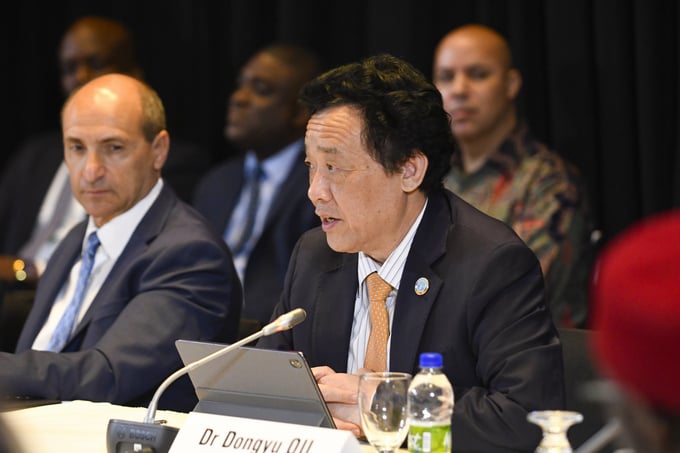November 23, 2025 | 20:07 GMT +7
November 23, 2025 | 20:07 GMT +7
Hotline: 0913.378.918
November 23, 2025 | 20:07 GMT +7
Hotline: 0913.378.918

The meeting in Barbados covered critical AMR topics such as financing, integrated surveillance and research and development.
Agrifood systems play a key role in limiting the spread of antimicrobial resistance (AMR) and the Food and Agriculture Organization of the United Nations (FAO) is fully committed to tackling what the UN lists as one of the top 10 threats for global health, FAO Director-General QU Dongyu today told the sixth meeting of the Global Leaders Group (GLG) on Antimicrobial Resistance.
The meeting in Bridgetown, Barbados, was the first time that members of the GLG, which is comprised of world leaders and experts, were able to gather in person due to the COVID-19 pandemic. Hosted by the Prime Minister of Barbados, Mia Amor Mottley, the meeting covered critical AMR topics such as financing, research and development, integrated surveillance, the role of the private sector, AMR and the environment and galvanizing political action to address AMR.
“FAO is fully committed to working with its partners to create more efficient, more inclusive, more resilient and more sustainable agrifood systems for better production, better nutrition, a better environment and a better life for all,” the Director-General said. Such agrifood systems transformation can now be better supported thanks to the inclusion of the AMR in the Pandemic Fund, he added.
The Director-General underlined the importance of a One Health approach to reducing the use of antimicrobials in the agrifood sector. One Health is an integrated, unifying approach that aims to sustainably balance and optimize the health of people, animals and ecosystems by recognizing that they are closely linked and inter-dependent.
FAO is currently preparing a 10-year global initiative to reduce the need for antimicrobials in agrifood systems. FAO has also developed the first version of the International FAO Antimicrobial Resistance Monitoring IT platform to address the existing information gap in agrifood systems.
In addition, FAO is hosting the AMR Multi-Stakeholder Partnership Platform, a mechanism to promote collaboration among a wide range of stakeholders at all levels across the One Health spectrum.
Looking ahead, the Director-General invited participants to a UN Food Systems Stocktaking Moment scheduled for July 24-26 at FAO's headquarters in Rome, in which AMR will be discussed.
AMR occurs when microorganisms such as bacteria, viruses, parasites or fungi become resistant to antimicrobial treatments to which they were previously susceptible.
Increasing use and misuse of antimicrobials and other microbial stressors (e.g. the presence of heavy metals and other pollutants) creates favourable conditions for microorganisms to develop resistance.
This in turn poses serious threats to human, animal, plant and environmental health, food safety, food security, and pandemic prevention, preparedness, and response.
AMR disproportionately affects low- and middle-income countries and contributes to almost 5 million deaths per year, according to the Global Research on Antimicrobial Resistance report. The World Bank estimates that in the next decade, AMR could result in a GDP shortfall of at least $3.4 trillion annually, and an additional 24 million people would be forced into extreme poverty by 2030 if no action is taken on AMR today.
(FAO.org)

(VAN) In Brazil, FAO unveiled a series of reports and initiatives showing how sustainable agrifood systems are a solution to the climate crisis.

(VAN) With names like neodymium and dysprosium, rare-earth elements sound exotic — and their perceived scarcity has only added to the mystique.

(VAN) In a new study published in Trends in Biotechnology, researchers used a gene-editing technology called CRISPR to increase a fungus's production efficiency and cut its production-related environmental impact by as much as 61%- all without adding any foreign DNA.

(VAN) A top official in Beijing’s Cop delegation says China is committed to clean energy – but US’s absence is a problem.

(VAN) The Bangsamoro region’s inflation rate rose slightly to –1.3 percent in October 2025 from –1.5 percent in September, the Philippine Statistics Authority (PSA-BARMM) reported.

(VAN) FAO-led report says protecting and restoring forests is crucial to boosting climate-resilient agriculture, rural livelihoods and global food and water security.

(VAN) Flagship partnership secures additional GBP 16.9 million to strengthen forest monitoring, transparency and country support to 2030.